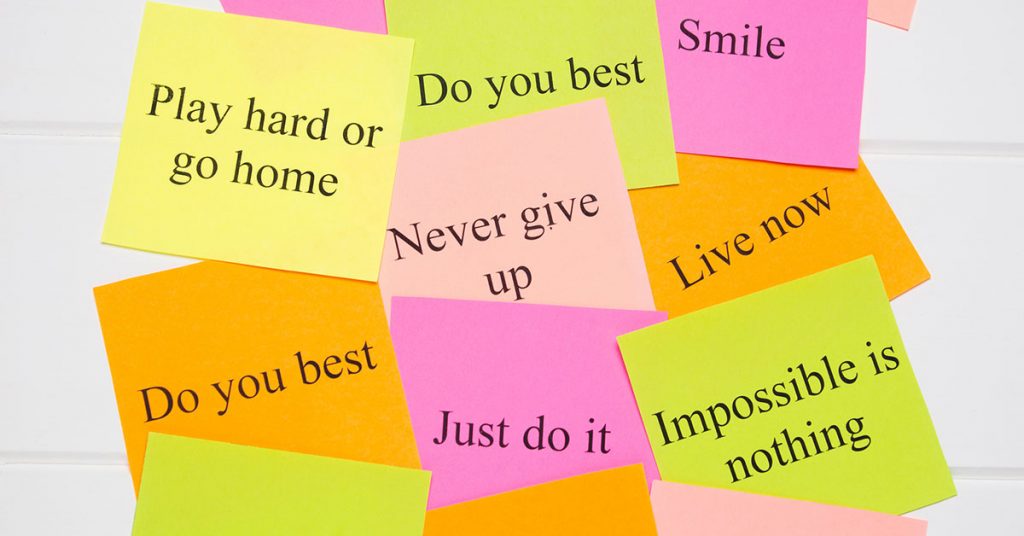Expert opinion says that you should memorise around 20 words per day. If you run through them a few times before you go to bed at the end of the day, then they should stick.
However, you need to be using these words on a daily basis as well. If you don’t use them in context regularly, you’ll quickly begin to forget them. You’ll also lose motivation, and before you know it, you’re memorizing pointless lists. The key is to regularly review and practice your word lists, using them in real-life examples. If you can do that through talking to a language-speaker, great! Watch foreign-language news broadcasts, or use some other real-life language resources, to keep the learning fun.
Real-life Examples
To think this through, let’s consider a real-world example. David is a bit of a newbie when it comes to learning French. He wants to achieve Victor Hugo-esque fluency, as he knows this will allow him to land the job of his dreams. He also can’t wait to hit the French Riviera and immerse himself in the sunshine and the local culture and cuisine.
He’s read the most recent language learning blogs available, he’s downloaded flashcard apps and he’s also bought a few rather expensive textbooks on learning French. He has even read some great short guides on learning a foreign language. As such, he’s ready to get started.
His goal? To learn fifty new French words each day.
That sounds like quite a task! Over the course of the year, it works out at 18,250 words. Which is, as David knows, the amount of words a native speaker has in their vocabulary.
To get started, David went ahead and downloaded 2,000 of the most popular French words, He’s got some pre-packaged flashcards, too, and they come complete with some cool illustrations. He’s all set! Sure, he’s quite aware that learning fifty new words each day is some challenge, but he’s prepared. After twelve months, he’s confident that he’ll be so fluent in French that he’ll be able to engage the natives without a hitch. He’s sure that memorising a set number of words each day is the best strategy.
What Happens Next

David starts off full of optimism and excitement. He’s super motivated and uses his apps and flashcards to help him learn relatively easy – but useful – words while he makes the commute to work. He also watches a few foreign movies in his spare time to help him understand how people talk in French.
After a fortnight, however, his motivation levels are beginning to drop a little. Because his flashcard app comes with a spaced repetition system, he has to review over a hundred words each day in order to achieve his objective of learning 50 new words.
He’s also getting a bit impatient with some of the other apps he’s using. He feels as though they’re not teaching him the sort of useful words French people actually use in everyday chit-chat.
After four weeks, David stopped checking his flashcards. After eight weeks, he pretty much gave up on French altogether. He decided that French isn’t all that great after all. And who cares about the French Riviera? Maybe he’d be better off learning Chinese, which his friend is currently learning.
Moreover, his friend is using a cool new app that lets her use mnemonics to memorise characters. Using this method, Davis reckons he can learn sixty characters each day, no sweat. If he keeps that up, he would easily pass the HSK level 4 language test once the year is out. How cool would that look on his resume?
Why Did David Fail at French?
David got off to a bad start by setting the wrong type of goal. Too many language learners obsess over how many words they can remember each day. A lot of memory flashcard apps come with a spaced repetition system (they’re super popular, in fact), and many language learners proclaim how amazing they are. They love the high-tech nature of these apps, as well as the promise that they’ll help you memorise 50 – 100 new words each day.

But what these apps (and certain textbooks) drum into people is the idea that mastering a language is simply a process of memorising as many words as you can (preferably as quickly as possible).
And that’s – as David learned – problematic. David did what these apps tell you to do: He concentrated on output, but he didn’t focus on input. There’s a crucial difference. Output meant that he was focusing on the amount of words he could remember each day, and while it seems like a noble goal, David wasn’t giving any thought to any of the fascinating resources he could have consulted that would have allowed himself to immerse himself in French.
Levels of Motivation
David also overestimated his motivation levels. His target was 50 words per day, which meant that he firmly believed he’d have the motivation to do that 365 days a year. It’s just not realistic.
As a result, it was only two weeks before David became weary and unmotivated. After a month, he was no longer interested in France. His process of learning was robotic and dry, and it meant that he lost all his passion for language learning.
Okay. But How Many Words Can You Learn In A Day Then?
Truthfully, I think this is the wrong question. Asking this question means that we’re still hyper-focused on output. Our mindset is wrong and is doing us more harm than good. We need to try a different approach.
The thing with memorising a new word is that, unless your plan is to actually use that word frequently (such as, in the English language, “that”), you’ll probably forget it soon. David was wasting time in the early days learning words like “elephant” and “tiger” – words that he barely ever used. Within a day or two, he’d forgotten them!
The human brain doesn’t allow us to memorise everything. If it did, we’d be overloaded. Instead, it eliminates the stuff we don’t need and focuses on the useful stuff.
As such, the key to memorisation is repetition. You need to learn something over and over until it sticks. There are plenty of memorisation techniques – such as mnemonics – that enhance our memorisation capabilities. The trick with mnemonics is that it convinces your brain that the new words you’re learning are essential. If it didn’t think they were essential, it wouldn’t remember them.
Memorising Lists of Words

When you make it your goal to remember X number of words each day, you make the mistake of memorising words that have no relation to one another, and which don’t always fit your current fluency level.
For example, maybe you’ll learn random words like “marshal” and “frog” on the same day just to get your word count up to 50. It’s not helpful.
Or, you might spend a day learning words related to finance, such as “economy” and “equity.” But if you don’t have a native speaker whom you can speak to about this subject matter, it’s again quite useless.
Ask yourself this: What’s the point in learning a bunch of random words that you may never even use?
This approach, then, is very backwards. It sounds good in theory (and, yes, learning 50 words per day does sound rather impressive), but it’s ultimately flawed. What you need to do is learn words, sentences and phrases in a more natural way.
What’s the Answer?
So far, I’ve tried to drum home the idea that memorising words is useless. However, not everyone who has read this will be 100% convinced. Some of you will still close this article and memorise a few new words. This is because of confirmation bias, which is when we read something that confirms the view we already had. We want someone to agree with us!
Even if this sounds like you, I implore you to look at alternative ways of learning a language that don’t involve setting crazy 50-words-per-day challenges. I call them crazy because a) they don’t work and b) they cause endless amounts of frustration. C) they also waste so much of your time.
Going back to what I mentioned earlier, aiming for input at the expense of output gets you off to a bad start when it comes to language learning. It means you’re memorising words but you’re not immersing yourself in the language.
Switch the Focus

The real solution – or, at least one of them – is to switch focus to input instead of output. Rather than driving yourself crazy trying to remember X amount of words per day, accept that you’ll forget most of them anyway, and that it’s better to expose yourself to a wide range of resources – music, films, textbooks, podcasts – that are suitable for your current level, and which teach you common sense, context, collocations, sentence structure, as well as how to engage with natives naturally. This makes more sense than trying to work out how many words you should memorise each day. Above all, you should consult a definitive guide to language learning, to get some tips on how to develop a more rounded approach to language learning.
And if you do happen to come across a word you’ve never seen before, and whose meaning you can’t grasp, jot it down in your notebook and return to it later. Take the time to really examine it – learn its different meanings and try it out in various contexts. This is a more – shall we say – holistic way of learning a new language. It’s more fruitful, more engaging, and it puts you on the path to fluency much, MUCH faster than learning X amount of words per day.
What about your own experiences with mastering a new language? Have you gone down the route of memorising X amount of words per day before? Let us know how that worked out in the comments below.










